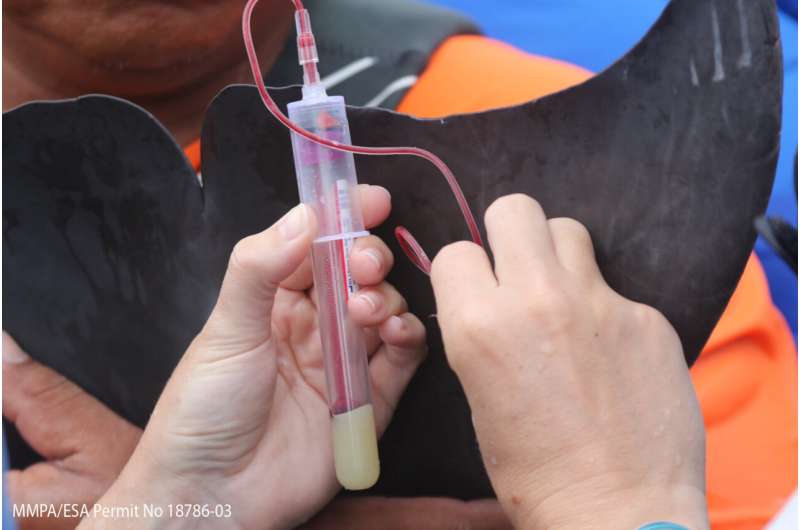August 25, 2022 report
Dolphins exposed to oil from Deepwater Horizon spill found to have changes in gene activities

A team of researchers affiliated with multiple institutions in the U.S., has found that dolphins living in the area where the Deepwater Horizon oil spill occurred have experienced changes in gene activity. In their paper published on the open-access site PLOS ONE, the team describes their analysis of blood samples collected from bottlenose dolphins living in Barataria Bay, Louisiana, near the site of the accident.
The Deepwater Horizon oil spill was the largest marine spill in history—approximately 800 million liters of crude oil seeped into the sea following an explosion on an oil platform in the Gulf of Mexico. After the spill, thousands of sea creatures were discovered dead on nearby seashores. In this new effort, the researchers sought to learn more about the long-term impact of so much oil making its way into an ocean environment.
For their study, the researchers chose to focus on bottlenose dolphins. They captured 71 specimens over the years 2013 to 2018 and gave each of them a physical that included testing their heart and lung function and conducting ultrasounds on those that were pregnant. They also collected blood samples before releasing the dolphins back into the sea.
Back in their lab, the researchers obtained blood or tissue samples containing genetic data from approximately 11,000 dolphins impacted by the spill obtained by various entities over the years. They also obtained samples of genetic data from dolphins living in Sarasota Bay, Florida, which had not been impacted by the oil spill, to use as a control group.
The researchers then conducted a genetic analysis of the samples looking for changes in gene expression—a marker for health impacts and found thousands of them. As one example, they found changes to the gene PRG3 that were similar to those found in humans with lung problems—expressions in the dolphins were found to be 8.3 times higher than in the humans. They researchers suggest such a change would likely lead to problems with new lung growth, limiting the life span of the impacted dolphins. They also found changes to gene expressions related to immune response. They noted that gene changes that occurred in 2013 were the worst, suggesting that the ocean is still slowly healing from the spill.
More information: Jeanine S. Morey et al, Transcriptome profiling of blood from common bottlenose dolphins (Tursiops truncatus) in the northern Gulf of Mexico to enhance health assessment capabilities, PLOS ONE (2022). DOI: 10.1371/journal.pone.0272345
Journal information: PLoS ONE
© 2022 Science X Network

















